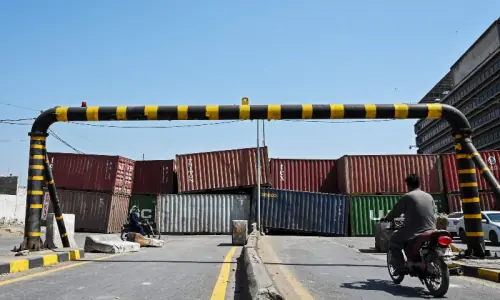A SET of rules to censor content on the internet have been notified by the government and are likely to fundamentally alter the internet as we know it in Pakistan.
Titled ‘Removal and Blocking of Unlawful Online Content (Procedure, Oversight and Safeguards) Rules 2020’, these are meant to guide the implementation of Section 37 (unlawful online content) of the Prevention of Electronic Crimes Act (Peca) 2016. It is important to note that these rules presumably replace the ‘Citizen Protection Against Online Harm Rules 2020’ which were notified in February by the federal cabinet but never denotified after promises to change them were announced in the face of local and international criticism against their draconian nature. There has been no clarification regarding their status by the government.
The lack of meaningful consultation with stakeholders has been pointed out several times, and the change in the name of the rules and content make the mala fide intent of the state clear: they are nothing but yet another attempt to control narratives and silence citizens in a way that is unconstitutional, disproportionate, impractical, and detrimental to Pakistan’s development.
On a macro level, there have been a few fundamental changes in the Rules as compared to the earlier version. For one, they quote definitions of crimes in the Pakistan Penal Code (PPC) sections, and empower the Pakistan Telecommunication Authority to interpret these and decide what content it deems unlawful, without any due process or trial. Second, the new Rules also apply to internet service providers — which include telecom operators and broadband operators — apart from social media companies. Third, they flout due process and accountability again as the PTA is empowered to complain, investigate, adjudicate, execute, and review appeals all on its own before a website owner or social media platform can appeal the restriction or blocking of online content in the high court.
The new Rules undermine the citizens’ right to privacy and enhance the state’s surveillance powers.
Going into the specifics of the Rules, they stipulate content regulation guidelines and expect all internet companies to implement them above their own globally applicable community guidelines, outlining types of content that will be deemed unlawful and should be removed within a day at the PTA’s request. It is important to note that companies do not do this as it contravenes international human rights principles relating to speech and privacy, by way of empowering a government to control what its citizens can say. This is why none of the international social media platforms are functional in China.
As it is, Section 37 of Peca — for which these Rules stipulate detailed procedure — borrows language from Article 19 of the Constitution, interpreting which is a function of the superior judiciary and not the job of a PTA official. In the exceptions to the freedom of speech rule, these Rules go one step further by defining the “glory of Islam” as per the blasphemy laws of Pakistan under Chapter XV of the PPC. This can especially threaten the already persecuted religious minorities, as well as become controversial considering disagreements over interpretations among followers of different sects of Islam.
Most controversially, there is an addition to the definition of “integrity, security and defence of Pakistan” — the Rules include the “dissemination of an information which intimidates or harms the reputation of Federal or Provincial Government or any person holding public office … brings or attempts to bring into hatred or contempt, or excites or attempts to excite disaffection towards the Federal or provincial Government”. Yet again, the PTA is empowered to interpret the constitutional language of Article 260 for definition of government officials.
This effectively renders any criticism of the government or its officials liable to be labelled as ‘unlawful’, especially in the absence of the mention of malicious intent, which is a test used in legislation to mitigate prosecution of good faith acts.
The Rules require all social media companies and internet service providers with more than half a million subscribers to open an office in Pakistan, appoint a local representative, and establish database servers, in addition to handing any data to the Federal Investigation Agency in a decrypted and readable form. This gravely undermines the right to privacy of citizens, and further opens the surveillance powers of the state that already has in place measures such as the Web Monitoring System which inspects all internet data packets in the country.
Intermediary liability is also extended, whereby social media companies and internet service providers are bound to comply with orders to censor content by the PTA and provide data related to users; in case of failure to do so, they face complete blocking of their platform or company in the country, as well as a fine of Rs500 million. In effect, the state is trying to privatise its censorship apparatus. It is important to note that this clause is in clear disagreement with the parent law — Peca — which limits intermediary liability under Section 38.
More suspect is the lack of transparency in the complaints mechanism: the Rules empower government agencies and departments to request blocking or restriction of content, and seek to keep the identity of complainant secret, which means that citizens and companies will never know who lodged a complaint against their content, especially when these powers are abused.
This will impact critics of the government, dissidents, opposition parties, human rights defenders, and journalists if the precedent of cases under Peca, transparency reports of internet companies, and disappearances and arrests of activists are kept in mind.
It is also detrimental to the economy where existing internet service providers that have invested billions in Pakistan, foreign companies that could potentially invest here, local start-ups that could create employment, and content creators would all be impacted by the unbridled powers.
The government must revoke these Rules, parliament should exercise oversight and amend the draconian Peca, and the courts must step in to stop the violation of fundamental freedoms.
If not, we should expect a showdown between internet companies and the government in the coming year, with the risk of platforms shutting down operations and cutting off Pakistan from the rest of the world.
The writer is director of Bolo Bhi, an advocacy forum for digital rights.
Twitter: @UsamaKhilji
Published in Dawn, November 22nd, 2020

































